Interview: Alex Lyras, Writer & Director of Aristotle/Alexander at the Getty Villa Theater Lab
The play is co-produced by Matthew Quinn of Combined Artform.
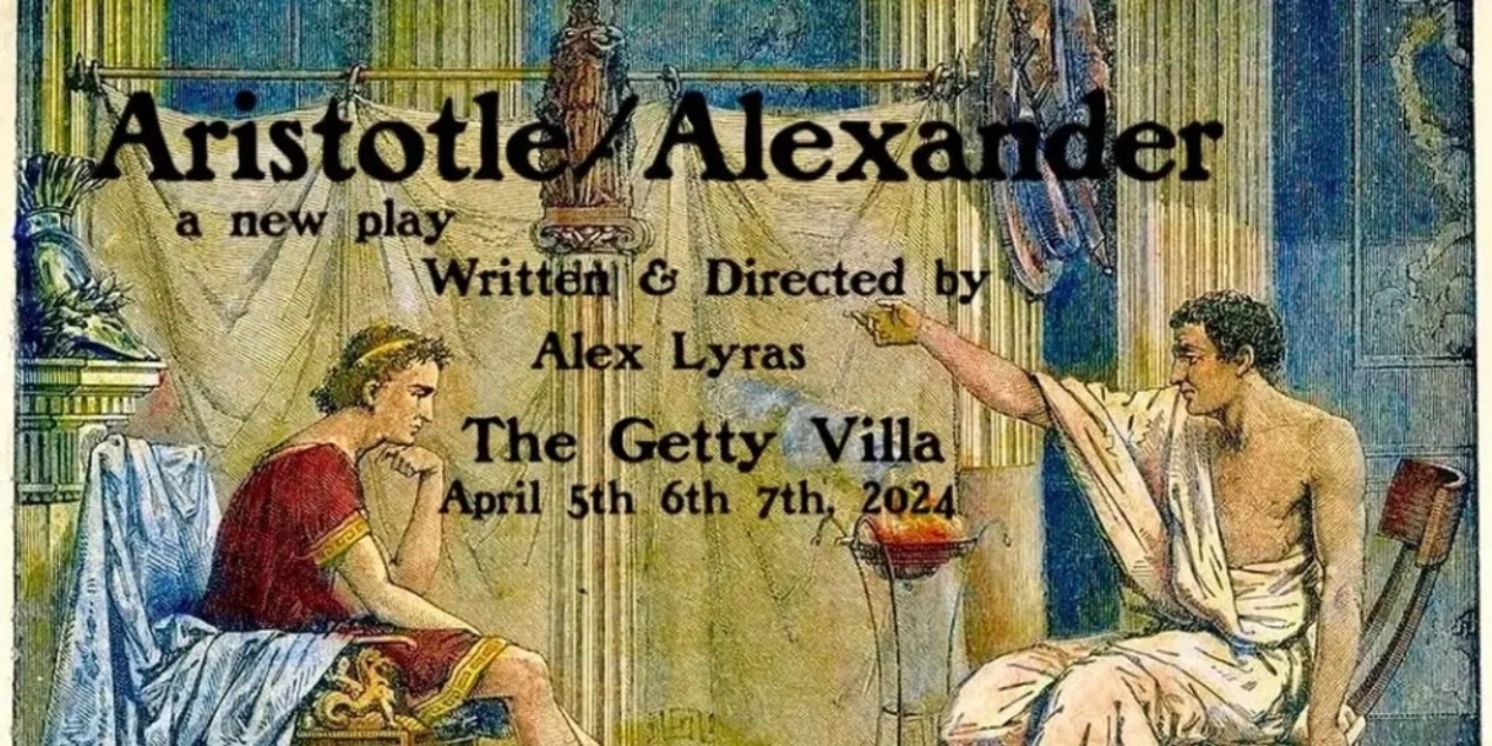
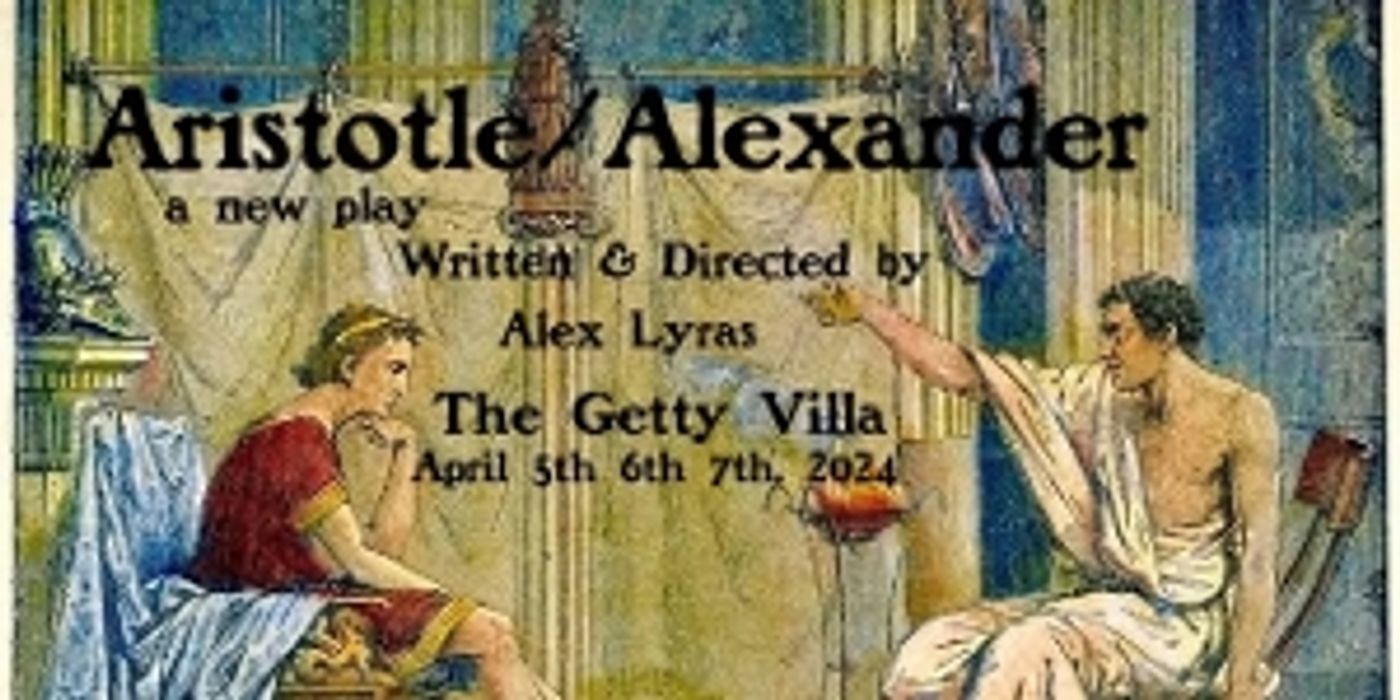
For over a decade, The Getty has hosted its Villa Theater Lab series, an exciting forum for reinterpreting classical theater. These workshops feature new translations of Greek and Roman plays and contemporary works inspired by ancient literature. Their latest offering, Aristotle/Alexander, explores the real-life relationship between Aristotle and a teenaged Alexander the Great in 342 BC.
As a former teacher of Greek Mythology and history, I could not resist asking Alex Lyras, the play’s writer and director, about his background studying the two great men, the play’s creation, and what audiences can expect to discover about these two ancient heroes.
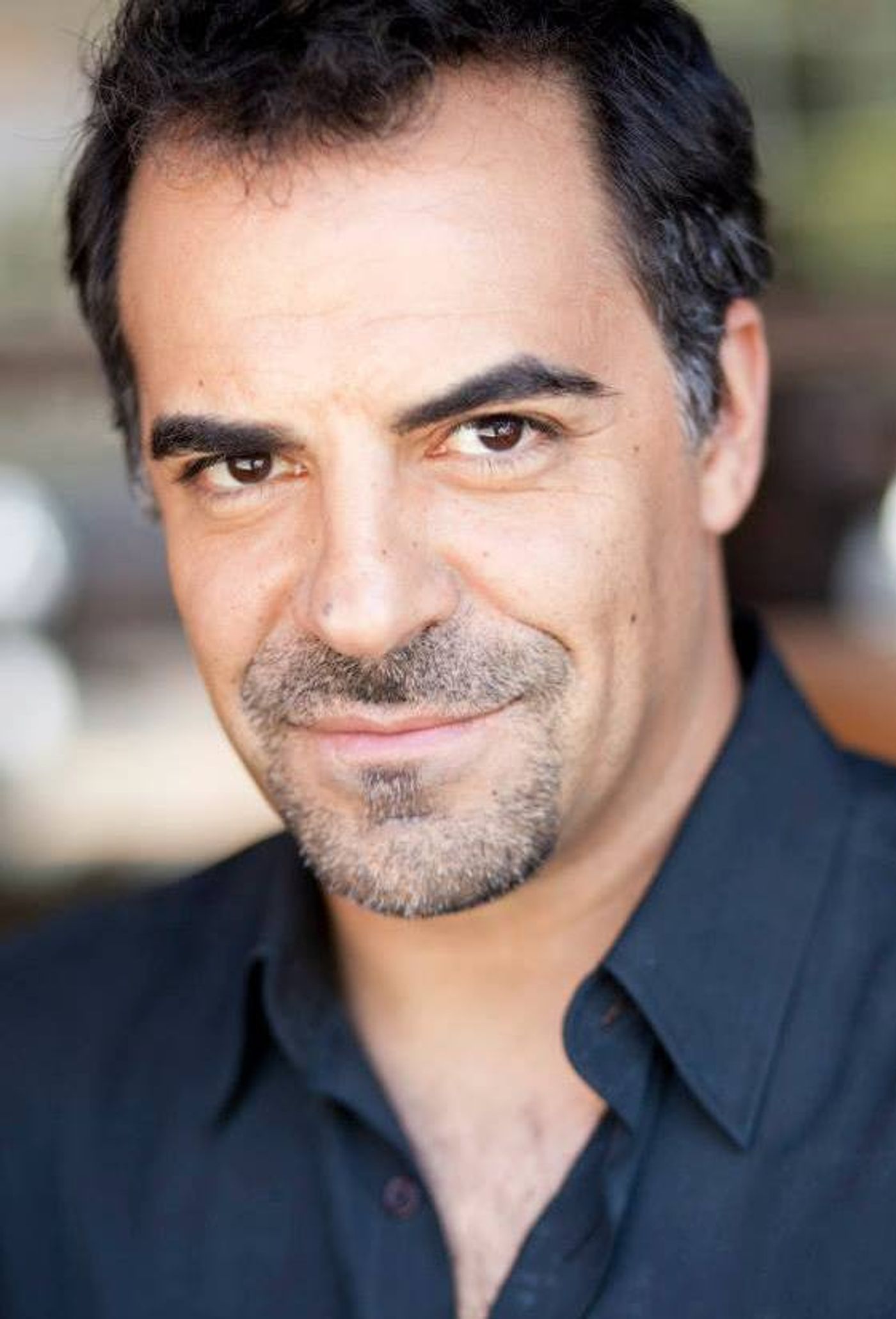
Alex Lyras, writer and director of Aristotle/Alexander at the Getty Villa.
Thank you, Alex, for taking time to speak with me. I am curious if your name has influenced your interest in creating a play about Aristotle/Alexander.
I think anyone with the name Alexander hears about the legend early. Fortunately, it’s not a lot to live up to… Maybe that’s why I go by Alex.
How long have you been interested in and studying Greek history?
Since early childhood, really. It’s the water we swim in as Greek Americans. There’s a pride of origin that gets passed down from generation to generation. But the spark really hit as an undergrad at Bucknell. I had a professor who had a gift for bringing antiquity to life. He was able to frame things in a way that reflected contemporary issues. It didn’t take long to understand that for as much as things have evolved over the last two thousand years, there are some fundamental questions that remain the same. Which values should we strive for as individuals? What are the best ways for people to live together in a society? How do we find fulfillment amidst so many competing drives?
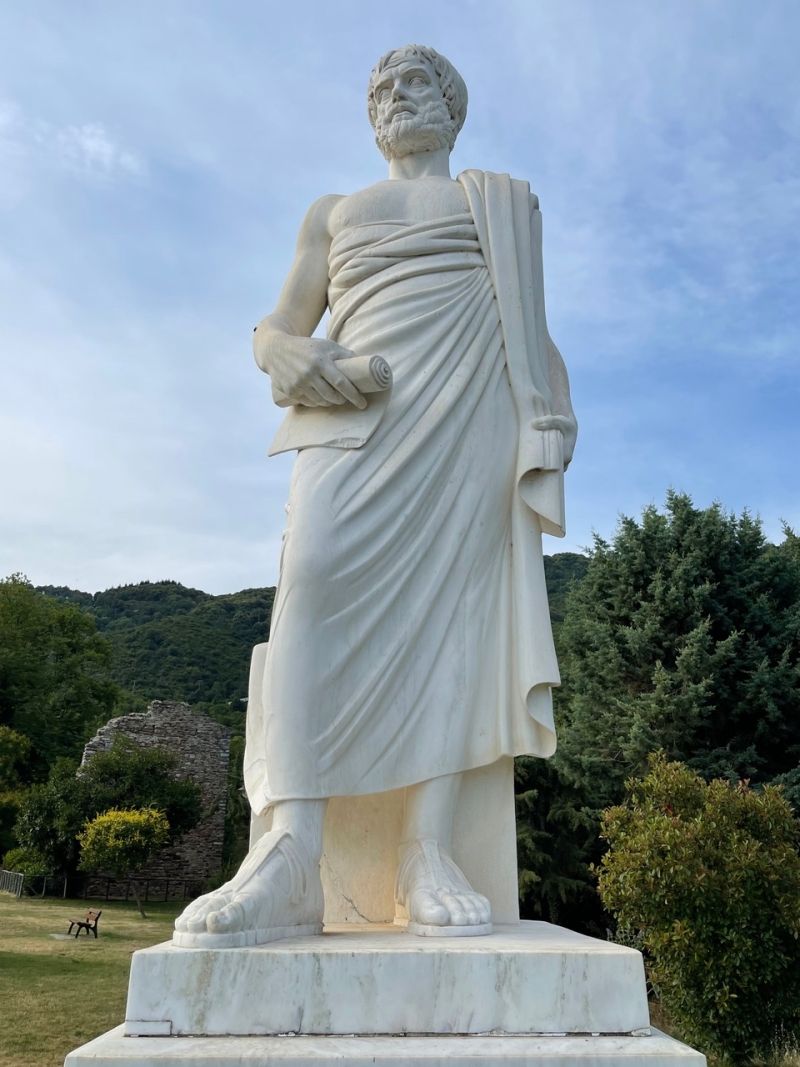
Statue of Aristotle, taken by Alex Lyras.
Is the entire play based on proven history of the two great men or somewhat fictionalized?
The best part about this particular segment of history is that while we know for sure it happened, there’s a real dearth of specific information. We know that Aristotle was deep into his biological studies before he arrived at King Philip’s court. And we know that Alexander was already training to fight and lead armies. But so much is unknown. That said, the play is grounded in the historical events that we’re sure occurred, such as King Phillip’s various battles and marriages.
What do you hope audiences will learn about the historic heroes?
While they were both brilliant in unique ways, they were also tragically flawed characters. Alexander was a gifted military strategist, but he was also insanely violent, wildly impulsive, often at the expense of his soldiers, and consistently self-destructive. He was infamous for the three-day hangover, for example. Totally out of commission from drinking undiluted wine. Aristotle is more of an enigma, and while there is little available concerning his personal biography, one thing is clear: he alienated a lot of his peers. I get the sense that he was on the spectrum in the way that many functional geniuses are. Great with complex ideas. Not so great with human relationships. But it’s really just creative conjecture.
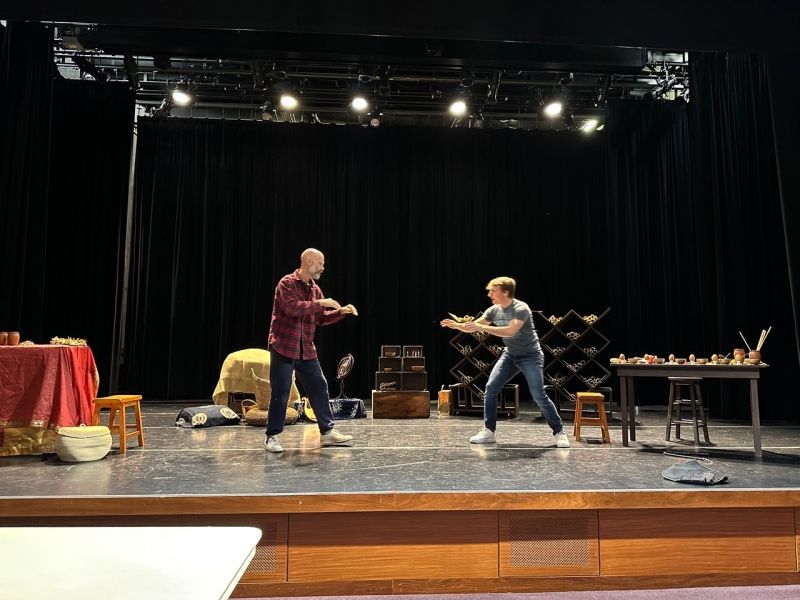
Andrew Byron and Nicky Clary in rehearsal for Aristotle/Alexander. Photo credit: Alex Lyras
What inspired you to create the play?
I realized that for all of the excellent historical fiction available on Alexander the Great, and there are some “great” ones, like Mary Renault and Steven Pressfield’s books, there was little to no focus on what his time with Aristotle was like. As a recovering philosophy major, I knew I could tackle the intellectual side of the story in a way a fiction writer wouldn’t. This was totally uncharted territory. And what inspired me most was learning how inherently dramatic this scenario was: Teacher vs Student. Adult vs Adolescent. Athenian vs Macedonian. Intellectual vs Soldier. Introvert vs Extrovert. It’s no wonder they smashed horns like rams.
Tell me about the process of its creation.
There’s a ton of material out there to dive into, from academic journals and comic books to movies, docs and graphic novels. I went through a lot of it. But nothing beats immersion. When I learned that all of the locations in Greece where Aristotle taught Alexander still exist and are open to the public, I went to see for myself.
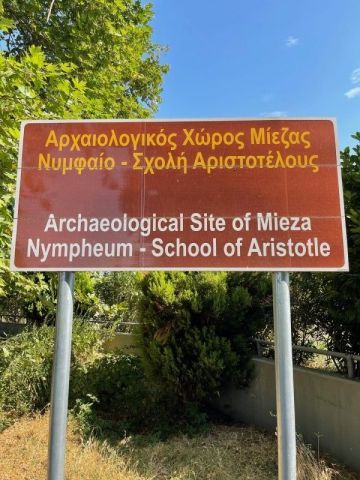
Photo credit: Alex Lyras
I sat at the archeological site where Philip built Aristotle's laboratory and wrote the actual play there. The Royal Tombs of Aigai is a breathtaking museum literally constructed over King Philip’s (Alexander’s father) burial tomb. I also visited Aristotle’s childhood home in Stagira, which is not far from Thessaloniki. I strolled around the Lyceum, Aristotle's school in Athens, and read his books there. It’s nerdy, yes, but also very intense. When you go to Greece armed with all this knowledge, it completely changes how you see things. It’s such a treat to be able to walk in the footsteps of greatness.
I felt the same way when I walked around ancient sites in Greece! Tell me about bringing the play to the Getty Villa stage.
I’ve been seeing productions at the Getty Villa for years and years and every time it’s a magical experience. I was well aware of their commitment for keeping the classics alive, and their affinity for creative takes on ancient drama and comedy. I shared the play with Ralph Flores who runs the programming and he responded to the material. The entire staff there is impeccable.
Is the play being staged as a modern production or like one presented in an ancient Greek amphitheater?
It’s definitely a modern interpretation, although the work is filled with nods to the ancient tradition, like mask work, ancient instrumentations and even sections of the play that are spoken in meter.
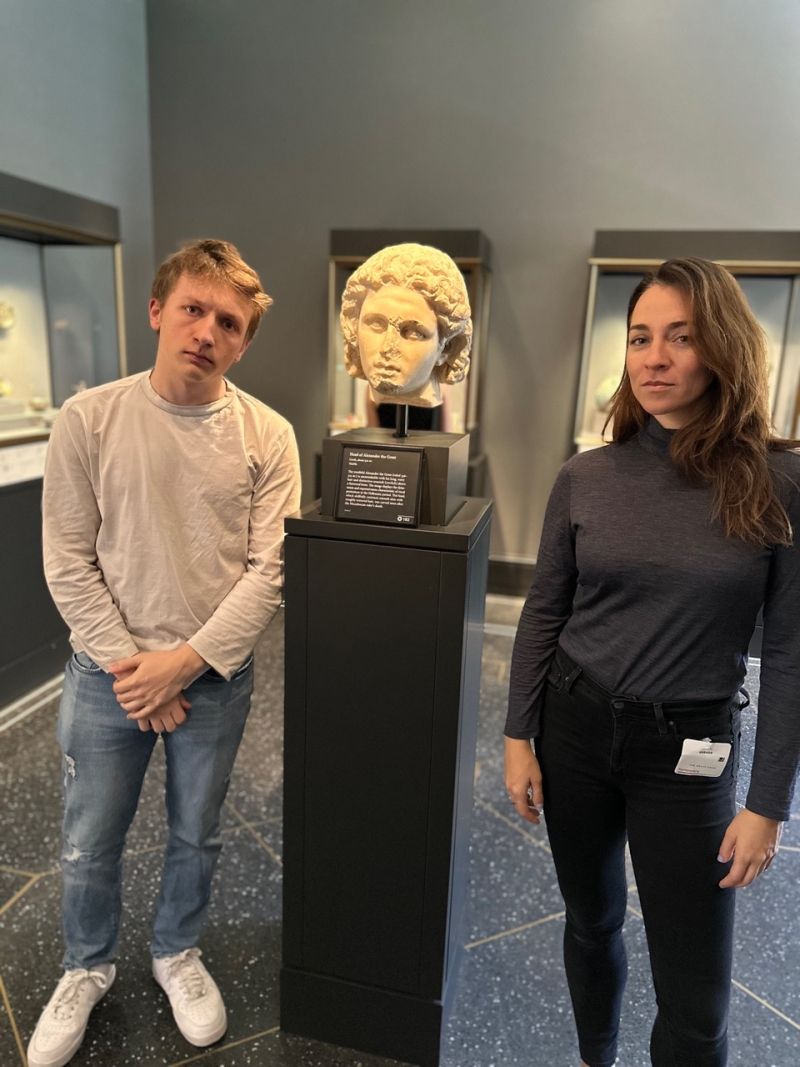
Cast members Nicky Clary and Joanna Kalafatis with an artist's rendition of Alexander on display at the Getty Villa museum. Photo by Alex Lyras.
Tell me about the cast and the roles they play in Aristotle/Alexander.
Nicky Clary plays Alexander. Not only did he rise above the others in his auditions, but he kind of resembles what modern scholars believe Alexander looked like. He’s bringing the role to life in a way I never imaged.
Andrew Byron is a nuanced British actor playing Aristotle, who prides himself on deep-dive research. His method begins with a thorough interrogation of the script, which, as a recovering philosophy major, I’m more than happy to do.
Joanna Kalafatis is a grounded east coast actor with piercing eyes and a commanding stage presence. She’s also spent half her life in Greece and knows the culture like a true native.
And John Kapelos, who we all know from The Breakfast Club, among countless other roles, is a Greek from London, Ontario who cut his teeth on stage in Chicago working with Second City. He’s a natural comedian, which comes out in the play, but he also knows his history, and the role is far more dramatic than comedic.
The play also features an original score composed by Andreas Fevos, born and raised in Athens, PhD from University of Thessaloniki and another from UCLA. He used a pallet of traditional instruments, like the ancient aulos, the oud, and the sukra from Anatolia. Our video designer, Jon Bonk, mastered his craft at a small school in the Boston area, called Harvard, I think?
Have you worked with any of them before?
First time working with everyone.
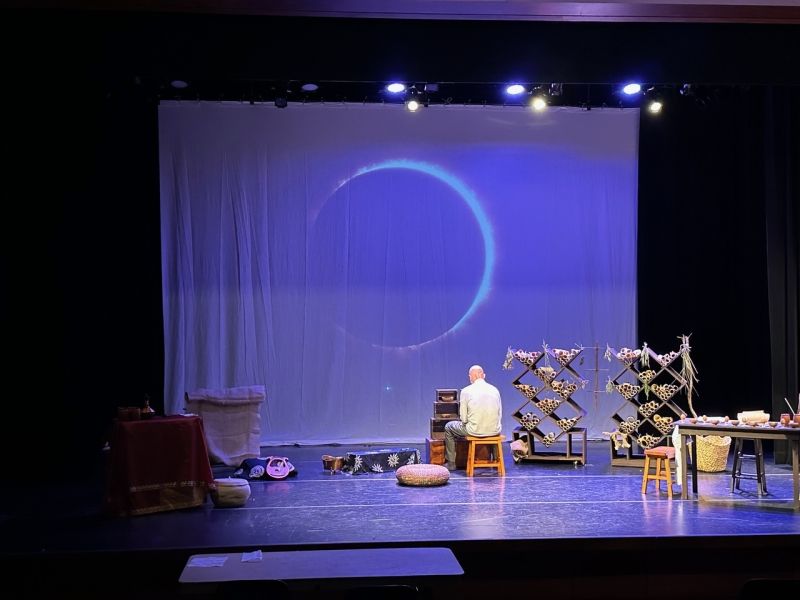
Aristotle/Alexander rehearsal photo by Alex Lyras
Since the play is a work-in-progress, will you be holding talkbacks with audiences after the performances?
Yes, on Saturday after the 3pm matinee. I’m allotting 8 hours for the talk back. I hope people don’t leave early.
I’ll stick around for that! Since the run is sold out, are plans being made to add more performances?
Definitely.
Is there anything else you would like to tell me about yourself or the play?
Just that it’s really rewarding to dedicate yourself to something out of pure love and personal fascination only to learn that boundless others are equally fascinated. For some reason, Aristotle and Alexander never seem to go out of fashion.
Thanks so much, Alex!
The work-in-progress performances of Aristotle/Alexander take place indoors at the Getty Villa, 17985 Pacific Coast Highway in Pacific Palisades, 90272 on Friday, April 5 at 7 p.m., Saturday, April 6 at 3 p.m., and Sunday, April 7 at 3 p.m. The play is co-produced by Matthew Quinn of Combined Artform. The run is currently sold out, and no tickets will be available at the gate. But as Alex shared, more performances are being planned. Check the event calendar for The Getty Villa and The Getty Center at https://www.getty.edu/visit/cal/
Videos

